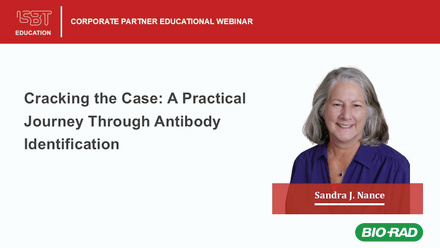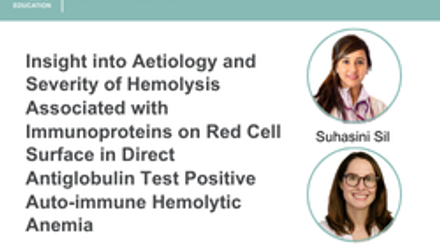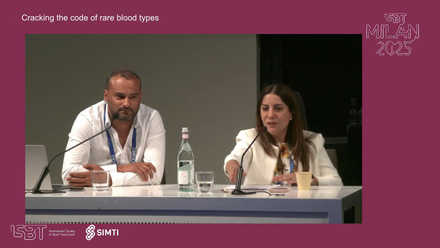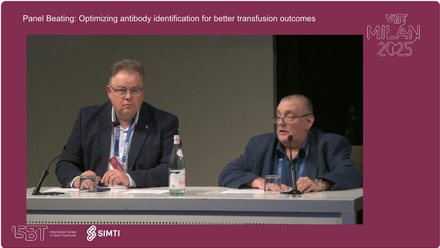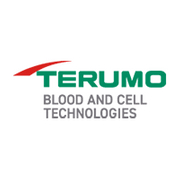The Fetal Maternal Immunology session included the following presentations:
1. Cecile Toly-Ndour: Rh disease prevention for women with partial D: is routine antenatal anti-D prophylaxis useful?
2. Mees Bruin: Natural course of pregnancies with alloantibodies against human platelet antigen HPA-1a
3. Renske van 't Oever: Natural course of hemolytic disease of the fetus and newborn after pregnancy with intrauterine transfusions
4. Jonas Lowack: HLA class I antigen knock out endothelial cells, a tool for the detection of endothelial-specific anti-HPA-1a alloantibodies
5. Xueyu Jiang: Pre-administration of baicalin inhibits red blood cell immunization in a mouse model of red blood cell transfusion
6. Ellen van der Schoot: Fetal RHD genotyping by droplet digital PCR for D variant mothers or children
MODERATORS: Agneta Wikman, Alan Lazarus
After the presentation, there was a questions and answers session, which is also included in the recording.
Abstract
Natural history of human platelet antigen (HPA)-1a alloimmunised pregnancies: Prospective observational cohort study
T De Vos1, D Winkelhorst2, L Porcelijn3, M Beaufort1, G Oldert3, J van der Bom4, E Lopriore1, D Oepkes5, M De Haas3, E van der Schoot6, M Bruin1
1Neonatology, LUMC, Leiden, 2Obstetrics, UMCU, Utrecht, 3Immunohematology Diagnostic Services, Sanquin, Amsterdam, 4Clinical Epidemiology, 5Perinatology, LUMC, Leiden, 6Experimental Immunohematology, Sanquin, Amsterdam, Netherlands
Background: Foetal and neonatal alloimmune thrombocytopenia (FNAIT), the platelet equivalent of haemolytic disease of the foetus and neonate (HDFN), can cause major intracranial haemorrhage (ICH) and organ bleeding in children during pregnancy and shortly after delivery. FNAIT results from maternal platelet-directed alloantibodies recognizing human platelet antigen-1a (HPA-1a), which is also expressed on endothelium and the placenta. If a pregnant woman has produced anti-HPA-1a, timely antenatal intervention with intravenous immunoglobulins (IVIG) can prevent the occurrence of severe ICH.
Aims: To assess the incidence of clinically detectable severe foetal and neonatal alloimmune thrombocytopenia (FNAIT) among human platelet antigen-1a (HPA-1a) immunised pregnancies and control pregnancies in a pregnant population in which both the pregnant woman and the obstetric care giver or neonatologist were blinded for the potential presence of HPA alloimmunisation.
Methods: Study design: Observational study
Participants Between 1-3-2017 and 1-5-2020, 153,106 women that were offered routine red cell antibody screening at the 27th week of pregnancy were eligible and were typed for HPA-1a.
Study outline Clinical data were collected of the HPA-1a negative women and a group of HPA-1a positive women (ratio 1:3), HPA-1a status was not reported to caregivers and researchers. HPA-1a antibody screening was performed in HPA-1a negative women. In HPA-1a immunised women antibody quantitation, HLA-DRB3*0101 typing and foetal HPA-1a typing were done.
Main outcome measures Proportion of neonates with severe FNAIT, defined as major bleeding and/or death related to bleeding, within HPA-1a immunised pregnancies without intervention. Secondary outcomes included mild FNAIT (minor bleeding and/or thrombocytopenia for which treatment was given), pregnancy- and neonatal outcome
Trial registration Clinicaltrails.gov NTC04067375
Results: We observed that 2.43% (3722/153,106) of the pregnant women were HPA-1a negative. Antibody screening was performed in samples from 913 pregnancies of 881 HPA-1a negative women (32 were included twice). Anti-HPA-1a was detected in 85 pregnancies of which 82 concerned HPA-1a positive foetuses. One pregnancy was excluded: this woman was treated with intravenous immune globulin (IVIg) because her previous child was diagnosed with FNAIT. In total, 81 HPA-1a immunised and incompatible pregnancies, 820 HPA-1a negative non-immunised pregnancies and 2704 pregnancies from HPA-1a positive women were included. One child (1.2%, 1/81) was diagnosed with severe HPA-1a mediated FNAIT (severe ICH) and three children (3.7%, 3/81) with mild FNAIT (two with haematomas and one with mucosal bleeding). Major bleeding was observed in 0.1% (3/2749) of the children of HPA-1a positive women. The incidence of clinically detectable severe anti-HPA-1a mediated FNAIT was 2.6 per 100,000 pregnancies. 15% (12/81) of the children from HPA-1a-immunised pregnancies were born prematurely (<37 weeks of gestation) compared to 5% (132/2749) of children of HPA-1a positive women (P < 0.001). Median birthweight percentile of neonates from immunised pregnancies was 0.46 [IQR 0.21 to 0.70] compared to 0.52 [IQR 0.26 to 0.77] in neonates from HPA-1a positive women. Hypertensive disorder during pregnancy was reported in 11% (9/81) of the immunised cases compared to 4% (120/2704) in HPA-1a positive pregnant women.
Summary/Conclusions: The incidence of major bleeding in FNAIT is 11 in 10,000 HPA-1a negative pregnancies. Premature delivery, lower birthweight and hypertensive disorders occurs more frequently in HPA-1a immunised pregnancies. The results of this study can be used to consider an HPA-1a screening program in pregnancy.


